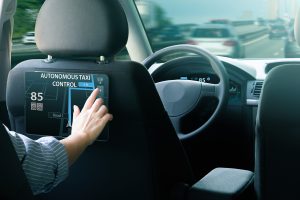
Self-driving cars are no longer just a futuristic concept—they’re on the roads today, changing the way we think about transportation. But what happens if you’re hit by one? Unlike traditional car accidents where a human driver is clearly at fault, self-driving car accidents can be legally complex. Determining responsibility involves multiple factors, from the vehicle owner to the manufacturer and even the software developers. If you or a loved one is injured in a collision with a self-driving car, here’s what you need to know.
Who is Liable in a Self-Driving Car Accident?
When a self-driving car is involved in an accident, liability may fall on different parties depending on the circumstances. Here are the potentially responsible parties:
1. The Vehicle Owner
If a privately owned self-driving car is involved in an accident, the owner may still be responsible, even if they were not actively controlling the vehicle. Many self-driving cars require some degree of human oversight, and failing to monitor or properly maintain the car could lead to liability for the owner.
2. The Manufacturer or Software Developer
If the accident was caused by a malfunction in the vehicle’s autonomous system, the manufacturer or software developer may be held liable under product liability laws. For example, if a vehicle fails to detect a pedestrian or misinterprets traffic signals, the company that created the system may be responsible for damages.
3. The Ride-Hailing or Fleet Company
Many autonomous vehicles are used for ride-hailing services. If a self-driving taxi hits you, the company’s insurance policy may cover your injuries, just as Uber and Lyft have insurance policies for accidents involving their human drivers.
4. Another Driver or Third Party
Sometimes, an accident involving a self-driving car is caused by a human on the road. If another vehicle cuts in front of an autonomous car or a pedestrian steps into traffic unexpectedly, liability may shift to those individuals rather than the self-driving vehicle.
5. Government or City Entities
If poor road conditions, malfunctioning traffic signals, or unclear signage played a role in the accident, the city or local government responsible for road maintenance could be partially liable.
How Insurance Works for Self-Driving Cars
Self-driving cars are still required to have insurance, and most states treat them similarly to traditional vehicles when it comes to liability coverage. The insurance process generally follows these steps:
- Filing a Claim – If you’re hit by a self-driving car, you’ll likely need to file a claim with the vehicle owner’s insurance company.
- Corporate Coverage – If the vehicle is part of a ride-hailing service, the company’s insurance policy may cover the accident.
- Manufacturer Responsibility – If a system defect is suspected, a product liability claim against the manufacturer may be necessary.
Because self-driving vehicles collect extensive data through cameras and sensors, accident investigations can rely on recorded footage, system logs, and AI decision-making data to determine what happened.
When You Need an Attorney
If you’re injured in a self-driving car accident, hiring an experienced personal injury attorney like Andrew Maze can be crucial. Here’s when you should seek legal help:
- The insurance company denies or undervalues your claim – Insurers may try to reduce payouts, especially in cases involving new technology like autonomous vehicles.
- There is uncertainty about liability – When multiple parties could be responsible, an attorney can help determine who should pay for damages.
- You suffered serious injuries – If the accident resulted in extensive medical bills, lost wages, or long-term disabilities, legal action may be necessary to secure fair compensation.
- A manufacturer’s defect is involved – Product liability cases against major tech companies require strong legal representation to challenge corporate defense teams.
What to Do After a Self-Driving Car Accident
If you are hit by a self-driving car, take these steps to protect your rights:
- Call 911 – Report the accident to the police and seek medical attention for any injuries.
- Document the Scene – Take photos of the vehicle, road conditions, traffic signals, and any visible damage or injuries.
- Get Contact Information – Collect details from the vehicle’s owner (if applicable) and any witnesses.
- Request Data from the Vehicle – If possible, ask for access to the car’s system logs, which may show what the vehicle was doing at the time of the accident.
- Consult an Attorney – Before accepting an insurance settlement, speak with a personal injury lawyer to evaluate your case.
Andrew Maze Can Help If You’ve Been Hit by a Self-Driving Car
Self-driving car accidents introduce new legal challenges, but the core principles of personal injury law still apply: if you are injured due to someone else’s negligence, whether it’s a vehicle owner, manufacturer, or company, you deserve compensation. As technology advances, laws will continue to evolve, making it even more important to have an experienced attorney like Andrew Maze on your side. If you’ve been in an accident involving a self-driving car, contact a personal injury lawyer to protect your rights and pursue the compensation you deserve.